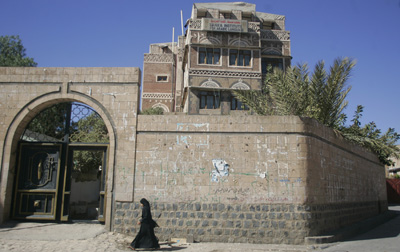It is possible that so-called “Christmas Day bomber” Umar Farouk Abdulmutallab came to Yemen for Al-Qaeda terrorist training because it was out of the limelight. Until now, international media has sent in journalists intermittently to cover stories on Somali refugees or the Houthi rebellion in the North, but few foreign journalists are based here and the majority of coverage had come from local stringers or freelancers.
Following Abdulmutallab’s failed attempt to blow up Northwest Airlines Flight 253 to Detroit, Yemen, a country that many may not be able to point to on a map, was instantly the hottest story in the international media. Suddenly scores of international journalists were parachuting in.
“It didn’t matter that there were five wars, it didn’t matter that there were displaced people from the war in Saada, the unemployment and poverty was of no concern,” said Nadia Abdulazia Al-Sakkaf, publisher and editor-in-chief of the Yemen Times, a local English-language newspaper. “I am upset with the international media. We had to do something really nasty, like Abdulmutallab, before people became interested.”
With the failed bombing, the international media was finally writing about the country, but “showed Yemen through the prism of Al-Qaeda, giving a completely distorted picture of the country,” said Haley Sweetland Edwards, an American freelance journalist who has been working in Yemen since August 2009. “It is absurd that they were here for six weeks and didn’t write about anything else.”
But how did the uproar change the way the local press in Yemen reports? Did the scores of foreign journalist, all demanding interviews and access, give local journalists the opportunity to exploit the same benefits as their foreign counterparts after they had left? In short: No.
“We are treated differently by default,” said Al-Sakkaf. “I have been trying to get an interview with the president for a year with no success. None of the local media has been able to, apart from one editor who got an interview by chance when he walked up to the president at an informal party and interviewed him there and then.”
“When the international press came they were granted interviews straight away,” she added. “I think even a Dubai-based sports channel got an interview with the president.”
Muhammed Kibsi, editor of the Yemen Observer, echoes Al-Sakkaf’s sentiments. “If I want to get an interview with the prime minister, I can’t get it unless I have some sort of relationship,” he said. “When the foreign journalists came they were able to get interviews in a matter of days.”
Kibsi has worked for foreign news journalists in the past and has seen firsthand the Yemeni government’s double standards. “I would phone a minister or a government employee on my Yemeni mobile and they would never pick up,” he said. “Eventually, I would ask the foreign journalist I was working with for their phone and call using an international number. Then I would always get a reply.”
But the treatment of the local press by the government extends beyond ignoring calls for interviews. CPJ recently reported the resurfacing of Muhammad al-Maqaleh, editor of the opposition Yemeni Socialist Party’s news Web site, Aleshteraki, who has been detained for five months—he alleges he has been tortured by his abductors. In January, Yemeni police surrounded the independent daily Al-Ayyam, a siege that ended with two deaths and nine injuries, according to local news reports.
And the local press is not only prevented from practicing journalism by the authorities; radical Islamic groups in Yemen have started attacking anyone who opposes their cause: “I received a threat last week because we published an advertisement for a bartender position at the U.S. Embassy,” said Kibsi. “The e-mail was from an unknown source and the author was angry that a job that involved alcohol was published in the Yemeni press.”
Kibsi has also had “multiple problems” with people hacking into his paper’s Web site. “We eventually had to close our Arabic-language Web site after it was repeatedly destroyed by hackers,” he said. “We just can’t run it anymore.”
Oliver Holmes is a freelance writer reporting from Sana’a, Yemen.
